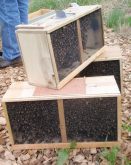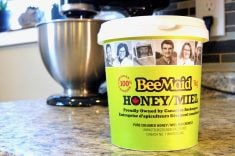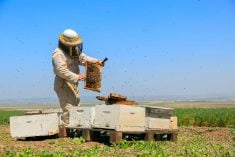Manitoba’s beekeeping sector won’t be endorsing any push to reopen the U.S. border to American bulk bee shipments.
In late February, a majority of members at the Manitoba Beekeepers’ Association (MBA) annual meeting shot down a resolution to support the Canadian Honey Council, should the national industry group ever lobby the federal government to allow boxed bees from the U.S.
Read Also

Manitoba sunflower plant gets local owners
Scoular’s sunflower and bird feed plant in Winkler, Man., bought by Orenda Commodity Services Ltd. out of Ste. Agathe.
Why it matters: Parts of Canada’s honey sector are seeing serious winter losses and few options to replace them, but the idea of reopening trade with parts of the U.S. has other beekeepers worried about importing pests.
Canada-U.S. bee trade ground to a halt in 1987, after Canada closed the border due to the risk of spreading two parasites — honeybee tracheal mite and varroa mite. The border later reopened to some trade of queens, in an effort to improve Canadian genetics, although bulk shipments remain off the table.
The debate has been highly political for years in Canada’s honey sector, MBA chair Ian Steppler said.
“It’s a pretty divisive issue amongst beekeepers,” he said. “This whole issue started before I even became a beekeeper, so it’s been ingrained into the industry.”
The recent MBA resolution was an effort to clarify the association’s position, should the Canadian Honey Council approach them, Steppler said.
The issue has recently gained a new spotlight, given previous winter losses, early signs of another high winter loss year in 2022 and previous issues getting bulk packaged bees from the usual sources, such as Australia, New Zealand or Chile, since the start of the COVID-19 pandemic.
“Beekeepers are trying to think, well, where are we going to get our replacement stock from?” Steppler said, noting that Manitoba is among the regions to see early warning signs of winter loss. “One of the places that we could tap into is the United States, into northern California where they could rear some replacement stock for us.”
Airlines had sharply cut the number of shipments under pandemic conditions, beekeepers have complained during the last two years.
Nationally, the Canadian honey sector is still clawing back volumes, following an 8.8 per cent dip in honey flow from 2018 to 2019, and a further drop the following year.
From 2018 to 2020, Statistics Canada reported honey production in total fell by more than 11.8 million pounds, from just under 95 million pounds to just under 83.2 million pounds. In 2021, Statistics Canada reported those volumes back up to about 89.8 million pounds.
Canada’s largest honey-producing province, Alberta, saw serious winter losses coming into 2020 as well as reduced honey flow thanks to dry conditions, according to the Alberta Beekeepers Commission. The commission later reported a loss of 20,000 hives and 30 per cent less honey, thanks in part to lack of available replacement stock. Imported bees were expected to be no less dear in 2021, the commission also said last spring.
In November 2021, the commission passed resolutions calling for the formation of a National Collaborative Stock Replacement Strategy as well as a new Canadian Food Inspection Agency (CFIA) risk assessment on sourcing bulk bees from parts of the U.S. As part of that argument, the group pointed to the age of the current assessment, completed in 2013.
Problem vector
Critics within beekeeping circles, however, say they are still worried about the spread of pests.
The 2013 CFIA risk assessment noted the threat of Africanized bee genetics, varroa mites resistant to control products, pests like the small hive beetle, as well as disease worries, like antibiotic-resistant American foulbrood — a highly contagious pathogen infamous for its damage to colonies.
“Key risk factors considered in the assessment are the distribution and prevalence of honeybee diseases in the U.S., the extensive migratory beekeeping industry, the overwintering of colonies in the southern part of the U.S., the lack of interstate movement controls, and the absence of a national honeybee management program,” the assessment read.
“I guess that’s kind of the tone that the membership this year supported,” Steppler said. “They agree that the risk of pests outweighs the advantages of accessibility to stock.”
The MBA membership rejected the resolution by a significant margin, he added.
The industry reported significant varroa mite issues in 2021.
Industry has speculated that warm weather, which extended the season last year, hive turnover and stress from the 2021 drought may provide fertile ground for mite problems.
Beekeepers have also noted significantly less control with common varroa mite products, the Co-operator reported earlier this year. Producers are being urged to diversify pest management strategies and to no longer assume appropriate control with some of those products alone.
Bringing in queens from northern California is vastly different from bulk shipments, Paul Gregory, president of Interlake Honey Producers, also argued.
“We have many concerns with varroa-resistant mites, Africanized bees. The list goes on and on,” he said. “But some beekeepers are facing really high losses this year, so there was increased pressure on the Canadian Honey Council to survey the industry and just see if there’s a broad interest in opening up the border again.
“Normally, when you lose bees, you don’t lose everything,” he said. “You lose a percentage and you just make your splits and, of course the hives will be weaker… but again, it was a tough year.”
It is extremely difficult to build back numbers when a significant number of bees have been killed off, he acknowledged. Further, he said, while there are “all kinds of guys” selling bees domestically, most are sold out.
The Canadian Honey Council did not respond to requests for comment as of press time.

















